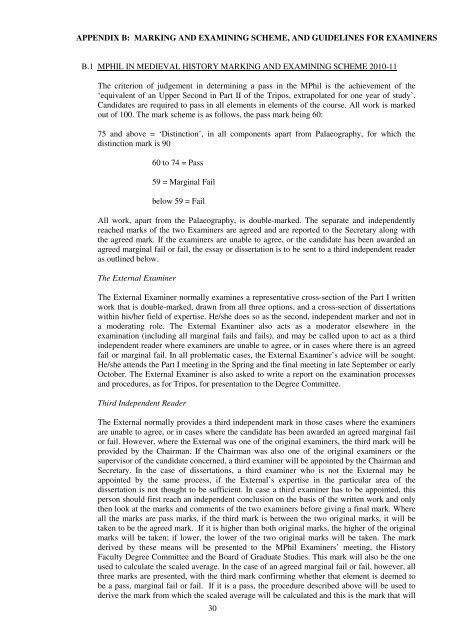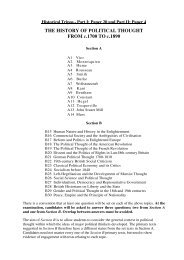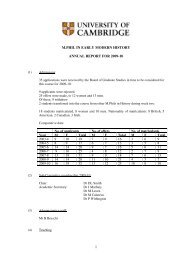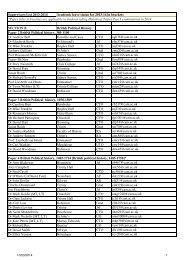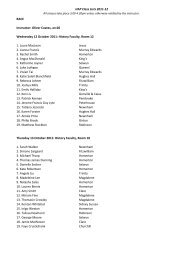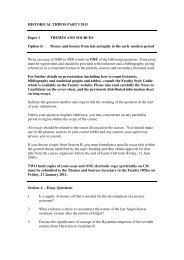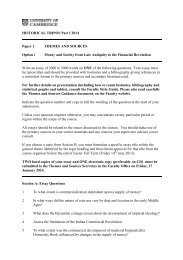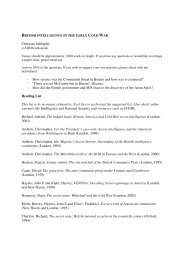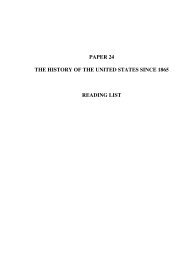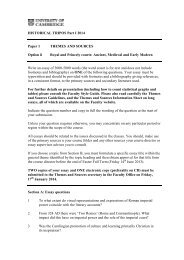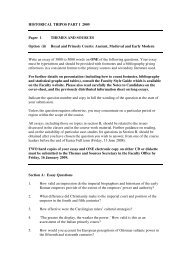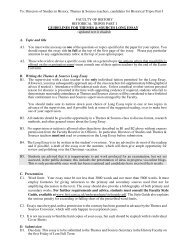Course Handbook - Faculty of History
Course Handbook - Faculty of History
Course Handbook - Faculty of History
Create successful ePaper yourself
Turn your PDF publications into a flip-book with our unique Google optimized e-Paper software.
APPENDIX B: MARKING AND EXAMINING SCHEME, AND GUIDELINES FOR EXAMINERS<br />
B.1 MPHIL IN MEDIEVAL HISTORY MARKING AND EXAMINING SCHEME 2010-11<br />
The criterion <strong>of</strong> judgement in determining a pass in the MPhil is the achievement <strong>of</strong> the<br />
‘equivalent <strong>of</strong> an Upper Second in Part II <strong>of</strong> the Tripos, extrapolated for one year <strong>of</strong> study’.<br />
Candidates are required to pass in all elements in elements <strong>of</strong> the course. All work is marked<br />
out <strong>of</strong> 100. The mark scheme is as follows, the pass mark being 60:<br />
75 and above = ‘Distinction’, in all components apart from Palaeography, for which the<br />
distinction mark is 90<br />
60 to 74 = Pass<br />
59 = Marginal Fail<br />
below 59 = Fail<br />
All work, apart from the Palaeography, is double-marked. The separate and independently<br />
reached marks <strong>of</strong> the two Examiners are agreed and are reported to the Secretary along with<br />
the agreed mark. If the examiners are unable to agree, or the candidate has been awarded an<br />
agreed marginal fail or fail, the essay or dissertation is to be sent to a third independent reader<br />
as outlined below.<br />
The External Examiner<br />
The External Examiner normally examines a representative cross-section <strong>of</strong> the Part I written<br />
work that is double-marked, drawn from all three options, and a cross-section <strong>of</strong> dissertations<br />
within his/her field <strong>of</strong> expertise. He/she does so as the second, independent marker and not in<br />
a moderating role. The External Examiner also acts as a moderator elsewhere in the<br />
examination (including all marginal fails and fails), and may be called upon to act as a third<br />
independent reader where examiners are unable to agree, or in cases where there is an agreed<br />
fail or marginal fail. In all problematic cases, the External Examiner’s advice will be sought.<br />
He/she attends the Part I meeting in the Spring and the final meeting in late September or early<br />
October. The External Examiner is also asked to write a report on the examination processes<br />
and procedures, as for Tripos, for presentation to the Degree Committee.<br />
Third Independent Reader<br />
The External normally provides a third independent mark in those cases where the examiners<br />
are unable to agree, or in cases where the candidate has been awarded an agreed marginal fail<br />
or fail. However, where the External was one <strong>of</strong> the original examiners, the third mark will be<br />
provided by the Chairman. If the Chairman was also one <strong>of</strong> the original examiners or the<br />
supervisor <strong>of</strong> the candidate concerned, a third examiner will be appointed by the Chairman and<br />
Secretary. In the case <strong>of</strong> dissertations, a third examiner who is not the External may be<br />
appointed by the same process, if the External’s expertise in the particular area <strong>of</strong> the<br />
dissertation is not thought to be sufficient. In case a third examiner has to be appointed, this<br />
person should first reach an independent conclusion on the basis <strong>of</strong> the written work and only<br />
then look at the marks and comments <strong>of</strong> the two examiners before giving a final mark. Where<br />
all the marks are pass marks, if the third mark is between the two original marks, it will be<br />
taken to be the agreed mark. If it is higher than both original marks, the higher <strong>of</strong> the original<br />
marks will be taken; if lower, the lower <strong>of</strong> the two original marks will be taken. The mark<br />
derived by these means will be presented to the MPhil Examiners’ meeting, the <strong>History</strong><br />
<strong>Faculty</strong> Degree Committee and the Board <strong>of</strong> Graduate Studies. This mark will also be the one<br />
used to calculate the scaled average. In the case <strong>of</strong> an agreed marginal fail or fail, however, all<br />
three marks are presented, with the third mark confirming whether that element is deemed to<br />
be a pass, marginal fail or fail. If it is a pass, the procedure described above will be used to<br />
derive the mark from which the scaled average will be calculated and this is the mark that will<br />
30


